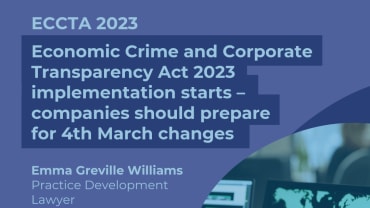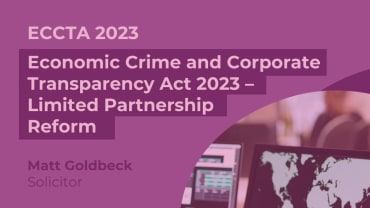While many firms are still adjusting to the Senior Managers and Certification Regime - it has applied to banks for some time now, insurers since December 2018 and will apply to FCA solo -regulated firms from December 2019 - the FCA is now proposing further changes to the regime. These changes are set out in Consultation Paper19/4 "Optimising the Senior Managers & Certification Regime".
It is intended that these changes will be effective before the Senior Managers Regime comes into force for FCA solo -regulated firms in December of this year. Comments should be submitted on the response form by 23 April 2019.
What are the key changes?
SM&CR and the Legal Function - An issue which has been debated for a while in the context of the Senior Managers Regime ("SMR") for banking firms and insurers in particular, but also relevant to enhanced FCA solo- regulated firms, is whether the position of Head of Legal function should be a senior manager role. The FCA rehearses some of the arguments for and against in its Paper.
On the affirmative side, it notes that the legal function can often play an integral part in the policy decisions of a firm, it is often not simply just an advisory role. The holders of Head of Legal perform a decision making role. While access to legally privileged information is an issue, if the role is to fall within the SMR there is no need for the FCA to be given access to legally privileged information. The FCA may surpervise without such access. SMR status could reinforce the importance of the role.
The opposing argument is that the concept of legal professional privilege is a fundamental tenet of the legal role and this does not sit well with the duties that arise under the SMR regime, in particular the Duty of Responsibility. Further, the concept of independence for a legal advisor could be undermined by the prospect of personal liability and is not compatible with the reporting duties which arise under the SMR Code of Conduct.
Having balanced the arguments, the FCA has decided to exclude the Head of Legal function from the SMR regime. It recognises the difficulties which apply with legal privilege and fitting this within the supervisory aspects of the SMR regime. At the same time, it notes that the Head of Legal will most likely be subject to the Certification regime so there is an element of regulation there which is more compatible with his or her duties.
There is a warning though that the exclusion of the Head of Legal from SMR does not cut across the duty of those that are senior managers to report matters to FCA where required by the FCA Rules and to ensure that those under their supervision, are aware of these reporting responsibilities.
Enhanced Regime for FCA solo -regulated firms
The FCA notes that the enhanced regime for FCA solo -regulated firms is not catching all the firms that it should. It is therefore tweaking the regime to ensure that more firms that have current total intermediary regulated business revenue of £35 million or more (based on a three year rolling average) are brought within the Enhanced Regime. The detailed criteria are set out in the Paper.
Changes to the Certification regime
The FCA acknowledges that questions have arisen as to the application of the Certification regime to the "client dealing function". The focus is on the fact that the definition of those involved in "client dealing function" possibly catches persons engaged in administrative functions. Such persons will be following standard procedures and unlikely to cause direct harm to consumers. However, the concern centres on such individuals being caught by the "client dealing function" because they take part in "managing" or "arranging".
The FCA will amend the scope of the "client dealing function" so that it will not cover individuals who have no scope to choose, decide or reach a judgement on what should be done in a given situation or who do not exercise significant skill in tasks allocated to them. In assessing individuals, the FCA states that a firm should assess whether the role is simple or largely automated and whether it involves discretion or judgement.
This change will apply equally to banks, insurers and FCA solo- regulated firms.
Clarifying application of Certification regime to systems and controls
This change will affect Core and Limited Scope FCA solo - regulated firms and small non directive insurers. The FCA notes that the function previously falling within the Approved Person Regime CF28 Systems and Controls, will largely be taken on board by persons needing certification as Material Risk Taker or as performing Significant Management Functions roles under the Certification Regime.
However, the FCA believes that there is a gap which may mean that for certain firms the systems and controls role is not currently subject to certification or approval. This is because for smaller firms a person may be approved as a senior manager but this approval will not cover the Systems and Controls role that he is performing as this is not an approved role for a smaller firm. The FCA is proposing to introduce a new Certification function to cover individuals performing Systems & Controls functions as a senior manager at firms where this specific function does not currently require approval as part of the senior manager role. The change only affects firms as detailed above where individuals are not required to be approved as senior managers for the systems and controls role.
Applying Code of Conduct Rule SC4 to all executive directors at Limited Scope firms
Another proposed change is being made to ensure that all directors at limited scope firms (as part of the FCA solo- regulated firms regime) need to comply with Rule SC4 of the Code of Conduct under the senior managers regime. Due to the vagaries of the current Rules, this Conduct Rule (which deals with notifying the FCA of events of which it would reasonably expect notice), applies to non -executive directors but not necessarily executive directors at limited scope firms. This is because not all executive directors at those firms need to be approved as a senior manager. This anomaly is being corrected.
In Conclusion
The SM&CR regime is by necessity somewhat complex, with varying levels of application to different types of firm. It is perhaps not surprising that clarifications and updates have been needed to ensure consistency in its application











